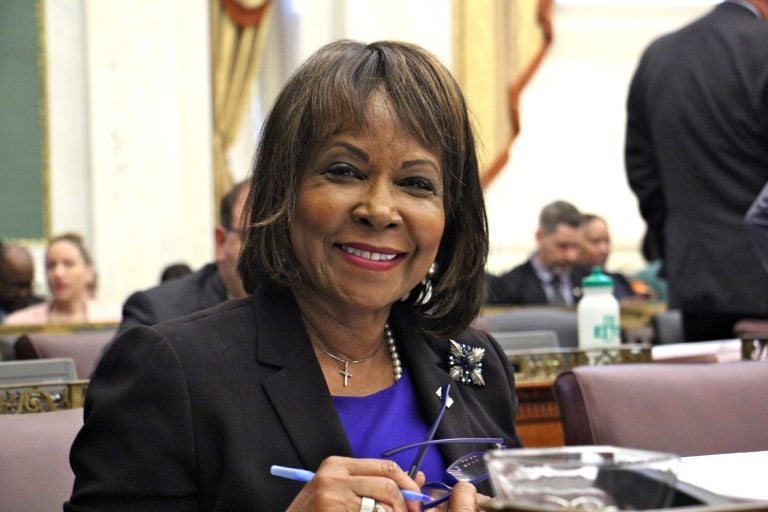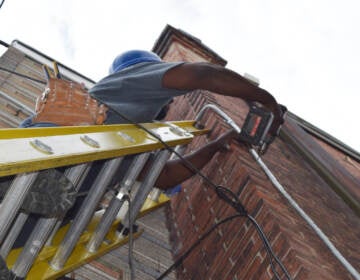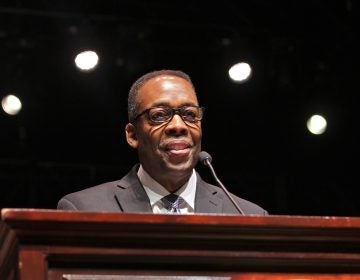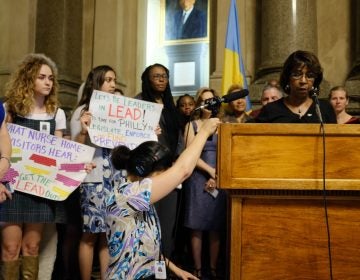‘Universal’ lead bill passes, making Philly the biggest U.S. city to require landlords to test for lead
It took 18 months for Philadelphia City Council to pass a lead safety bill aimed at preventing children from being exposed to lead paint in apartments.

City Councilwoman Blondell Reynolds Brown. (Emma Lee/WHYY)
After 18 months of deliberation, City Council on Thursday unanimously approved a bill intended to prevent children from being poisoned by lead paint in rental homes.
The bill will require landlords to test all rental properties built before 1978 for lead every four years. Though paint containing lead was banned in ‘78, children can still be exposed to the toxin in pre-78 units if newer coats of paint peel or degrade.
“At this moment, nine out of 10 council districts have a zip code where one out of 10 children are poisoned by lead,” said Councilmember Blondell Reynolds Brown, who wrote the legislation. “We can and must do better.”
The councilmember’s bill attempts to address enforcement issues with the current law, which she passed in 2011. Under that legislation, inspections are only mandated for landlords renting properties built before 1978 to families with children 6 years old or younger. But the city estimates that only 5,776 of 22,000 eligible rental units have complied with the regulation. Lead exposure can cause developmental problems in children and research has found that most children who are exposed come into contact in the home where they spend most of their time.
Landlords say the bill is a ‘terrible thing’
Reynolds Brown’s legislation was expected to pass in the spring but lobbying by landlord lobbying associations slowed the process.
“This legislation has been a marathon and not a sprint,” said Reynolds Brown, during her speech before the bill’s final passage.
Originally, the legislation called for inspections every two years but the Councilwoman changed requirement to every four years after meeting with representatives from landlord groups and other interest groups.
“It took two years, but we’re here and today is a big, big victory,” said George Gould, a lawyer with Community Legal Services who has been one of the bill’s most ardent champions. He said that tenant and children’s health advocates still want to try to tweak the bill to reduce the gap between inspections to every three years.
Landlord groups are still not happy with the legislation, despite their successful lobbying for amendments.
“We got a lot of it watered down, but I still think it’s a terrible thing for the city, what happened today,” said Harvey Spear, a representative for the landlord advocacy group HAPCO.
“This is going to affect low- and moderate-income landlords more than anyone else because they won’t be able to afford the testing. To do legitimate dust testing, you are going to lose a month of rent, they won’t be able to afford that.”
The Kenney administration was involved in the negotiations over the bill and supports it. If signed into law as expected, the legislation will go into effect on Oct. 1, 2020 and set a national precedent, Reynolds Brown said in a statement. The Councilwoman refers to the policy as “universal lead certification” though it only applies to units built before 1978.
“If the Mayor signs this bill into law, Philadelphia will become the largest city in the United States to require universal lead-safe certifications in order to obtain a rental license,” she said.
In the works: a rebate for landlords who remediate
Just before the bill was passed, Republican Councilmember at-large David Oh introduced a bill aimed at providing a tax rebate to landlords who get their properties fully remediated for lead safety hazards. If a property is fully remediated, a landlord does not need to get the regular inspections anymore.
“In reality, there are a lot of folks who can’t afford these changes,” said Oh, explaining that he introduced the legislation so that he could feel better about voting for Reynolds Brown’s bill.
Gould questioned whether the city should offer a tax remediation of 100%. He said that the policy would effectively pass on the cost of remediation to taxpayers. He suggested that the rebate be available only to low-income landlords.
WHYY is your source for fact-based, in-depth journalism and information. As a nonprofit organization, we rely on financial support from readers like you. Please give today.







